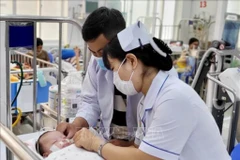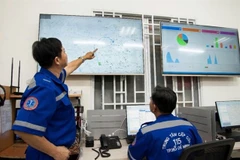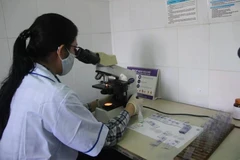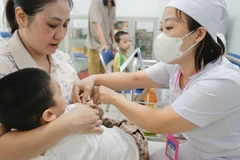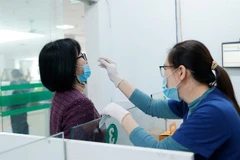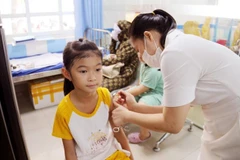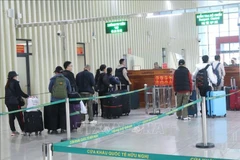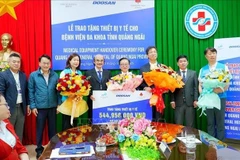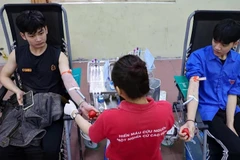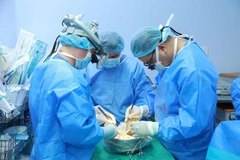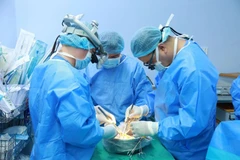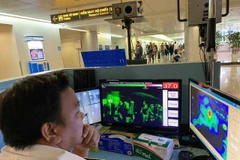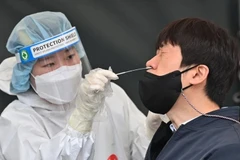 On February 18, the last two patients at the National Hospital of Tropical Diseases are discharged from hospital. (Photo: VNA)
On February 18, the last two patients at the National Hospital of Tropical Diseases are discharged from hospital. (Photo: VNA) Hanoi (VNS/VNA) - Vietnam has gradually developed an effective treatmentplan for coronavirus patients with 15 out of 16 infected casessuccessfully treated, the Ministry of Health has said.
Speaking at a conference onFebruary 19, Dr Luong Ngoc Khue, Director of the ministry’s Department ofMedical Examination and Treatment and deputy head of the sub-committee ontreatment at the National Steering Committee for COVID-19 Prevention andControl, said although there is no specific drugs that kills the virus, thetreatment regime applied has proved to be working.
Among those successfully, many have been reported underlying diseases such ashigh blood pressure, heart disease, diabetes and lung cancer.
By February 19, nine have been discharged from hospitals. The remainingpatients are in good health and will be discharged in the coming days, he said.
Khue said since the early days of the epidemic, the health sector hadimmediately convened the professional council with leading professors todevelop and update guidelines for early treatment.
These guidelines have been implemented at hospitals and health clinicsnationwide. After the first three patients were discharged from HCM City’s ChoRay Hospital, Khanh Hoa Tropical Hospital in the central province of Khanh Hoaand Thanh Hoa province General Hospital in Thanh Hoa province, the committeecontinued to adjust their treatment regimen.
Specific treatment steps, including initial reception instructions, quarantine,drug usage and emergency equipment for critically-ill patients have beenupdated to deal with the epidemic.
No new infected cases have been reported in Vietnam since February 13. Amongthe 16 people that tested positive, none have become severely ill and nofatalities will be reported, he said.
On February 18, the last two patients at the National Hospital of TropicalDiseases - the frontline hospital offering the COVID-19 treatment in the north– and two patients at the district-level health clinic in the northern provinceof Vinh Phuc, which recorded the most infections, were discharged from hospital.
The Vietnamese-American patient at HCM City’s Tropical Diseases Hospital hastested negative twice. The three-month-old baby at Hanoi-based NationalChildren’s Hospital is also negative.
They are both in good health, will continue the treatment and soon bedischarged from hospital.
The committee has asked relevant units, health experts andscientists to keep synthesising data on epidemiology, clinical treatment andtreatment results to complete the treatment regime.
At the conference, the committee also discussed and agreed on a number ofissues on receiving foreign workers returning to Vietnam to work, issues onborder control and immigration control to promote socio-economic activities.
In addition, the committee has asked relevant agencies to closely monitor andcomplete the procedures to announce the end of the epidemic in Khanh Hoa andThanh Hoa provinces.
Vietnam has also prepared preventive measures to deal with the virus in hospitalsat all levels.
Patients with symptoms not considered severe will be treated at district-levelhospitals. Patients in Thanh Hoa and Khanh Hoa provinces will attend localhospitals.
Quarantine work must be divided into three areas. The first is for suspectedpeople, the second is for those infected but in good health, and the final isfor the patients with severe symptoms. All these areas must strictly follow theministry’s criteria on biosafety and infection control.
Deputy Prime Minister Vu Duc Dam, who is also head of the National SteeringCommittee for COVID-19 Prevention and Control, praised military units for theirefforts in the prevention and fight against the coronavirus at the onlineconference on February 19.
He stressed the military units needed to strictly control the border, organisequarantine for citizens returning from affected areas and disseminateinformation about the illness in the future.
Currently, Vietnam still has 34 unconfirmed cases and more than 1,530 people inclose contact with people who may have the virus or those arriving fromepidemic areas. All of them are under quarantine.
By February 19, there are 75,203 COVID-19infected cases worldwide and the number of deaths reached 2,010. In Chinaalone, 74,186 cases have been reported with 2,004 deaths./.



